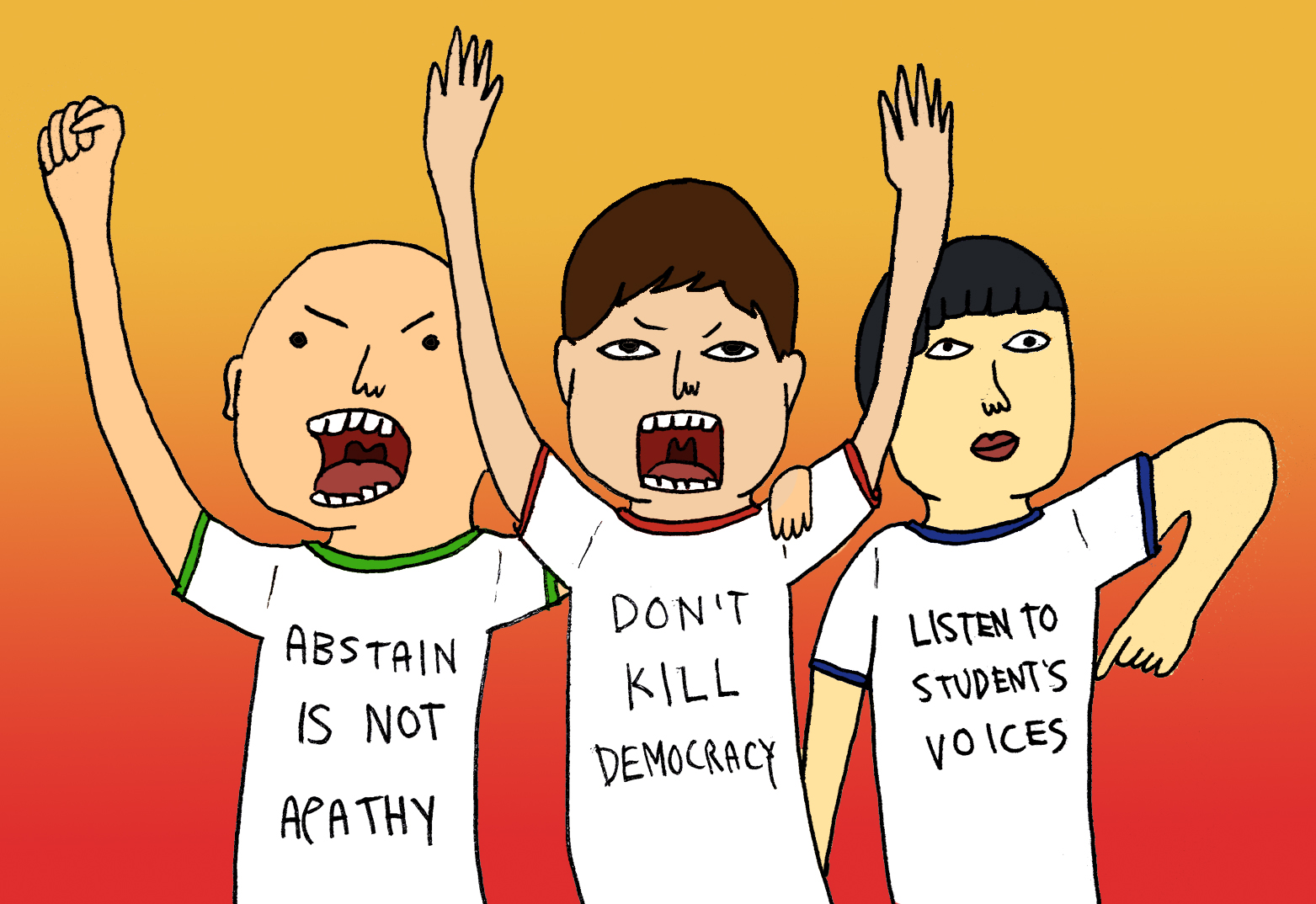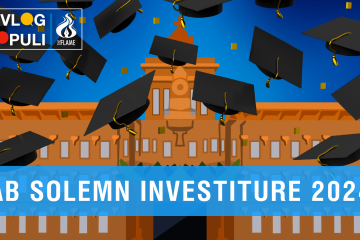
THE PREVIOUS academic year has passed and so has the period of student council elections. However, Thomasians are left to deal with the aftermath of the messy event.
After abstentions left vacant the positions of president, vice president, treasurer, and auditor in the Central Student Council (CSC), and vice president-internal, secretary, and auditor in the Arts and Letters Student Council (ABSC), many saw a start of an era in which Thomasians properly scrutinize candidates before voting.
So when the appeals on abstentions filed by former CSC presidential candidate Steven Grecia and ABSC vice president-internal bet Daniela Frigillana ultimately led to the disregard of “abstain” and proclamation of candidates with the most number of votes in the CSC elections, the two candidates earned ire from the majority of the Thomasian electorate.
Many took to social media to voice out their dissent, and a few days after the proclamation, Grecia, Gabriela Sepulchre, Daveson Jay Nieto, and Richard Javier resigned from their positions.
Thomasians have previously been labelled as apathetic and accused of being silent in the face of issues that matter.
But with the recent events in Thomasian student politics, do these accusations still ring true today?
‘Political awakening’
For Journalism junior Adam Ang, Thomasians’ active involvement in student politics resulted from the “bare attacks of the administration” to students’ right of suffrage. “We can consider [the mass abstention] as a protest, a manifestation of students’ discontentment with the personality politics offered by recognized political parties.”
The Central Judiciary Board (CJB), CSC’s judicial arm that is mostly composed of University officials, previously ruled that the Central Comelec should not have included “abstain” in the ballots for the elections. CJB then ordered the poll body to declare candidates with the highest number of votes as winners of the CSC elections.
History senior Tiarra de Sotto described Thomasians’ rising involvement in student politics as the change that the University needs. “I felt that it (mass abstention) was a student revolt against a terrible rule of so-called student leaders.”
Although Thomasians have always stood up for their principles, one of the reasons why students seem to be actively participating in student politics today is that the issue being talked about is “so big” that every student already has an opinion about it, ABSC President Reymark Simbulan said.
Thomasians, however, were not simply joining the bandwagon by talking about the issue, Simbulan added. “We all voted in our separate ballots. Hindi naman pinag-usapan na mag-abstain tayo. It just so happened na pare–parehas tayo ng opinyon […] kaya pare-parehas tayong na-involve doon sa issue.”
UST Department of Political Science Chairperson Dennis Coronacion said the mass abstention was a sign that Thomasians have already “awakened.”
“Nag-umpisa na sila magalit sa mga traditional politicians dito sa campus, which I agree with totally. [Thomasians] already realized that the system that they have has not been working for them.”
Why the sudden involvement?
For Coronacion, students being affected negatively by the happenings during the election period and what the candidates do contributed to the sudden participation of Thomasians in student politics. “Nagkaroon ng reawakening [ang Thomasians] because of the public embarrassment caused by the candidates themselves,” Coronacion said, referring to the time when Sepulchre and fellow CSC bet for vice president Renz Santiago drew flak on social media for their disappointing answers on what should be done in case President Rodrigo Duterte declares martial law in the country.
The political analyst said Thomasians were humiliated by the said incident because CSC candidates represent the Thomasian community. The electorate, therefore, sought to redeem themselves by being involved in the elections. “Ang pinarusahan ay ‘yung candidates, which they deserve naman.”
Simbulan said social media was also a factor in the students’ participation. With media organizations giving information about student politics, Thomasians have no choice but to be involved.
Same old silence
Despite the recent uproar within the Thomasian community, Coronacion said Thomasians still remain to be “passive” as ever. “Basically, our students are not really into politics. They’re not actively participating in student politics or campus politics unless, of course, there are personal stakes involved.”
The voter turnout for the academic year 2016 to 2017 was 57.58 percent. This saw almost a 30 percent drop from the 86.84 percent voter turnout for the academic year 2015 to 2016.
“[A]ng voting behavior pattern ng mga Thomasians [ay] passive. Kaya lang sila naging intense [ngayon] was because of the embarrassment that they received. Pero despite that, what was the result of the voting turnout? Mababa. […] Galit na sila noon ha,” Coronacion said.
Although Thomasians have very strong sentiments on the political issues in the University, majority of them do not know how to translate their views into actions, the political analyst claimed. “Ang tawag diyan [ay] Facebook activism, social media activism, pero walang pinatutunguhan na definite action, walang concrete result.”
Simbulan echoed Coronacion, and said Thomasians are “more on opinion rather than actions.”
“They don’t make an effort to know what’s happening inside the University. That’s why they are branded as apathetic,” the ABSC president said.
Apart from this, Coronacion said that even when Thomasians are finally discarding their apathy, recent events would show that they still do not have a clear understanding of the laws.
One example of this is when Thomasians argued that the positions where abstain won should be declared vacant. The political analyst said UST follows the plurality system, in which “abstain” is counted but does not affect the result of the elections.
“’Pag plurality rule, tapos walang kalaban, ‘yung isang kandidato unopposed, isang boto lang ang kailangan niyan, panalo ‘yan. Kahit mag-abstain lahat, isa lang bumoto, [mananalo ‘yan],” he said, referring to Grecia’s situation during the CSC elections.
With this, Coronacion calls on Thomasians to comply with the rules “that the students themselves have established,” and to follow the correct process on revising them if the laws no longer cater to the Thomasians’ interests.
“Ang law, nagbibigay ng stability ‘yan. Well, the moment na dinisregard mo ‘yan, gugulo,” he said. “Remember that what we are promoting in this school, especially in AB, is that we have to follow the rules, the laws. Ang tawag doon rule of law, not rule of men.”
Moving forward, Coronacion hopes that the next student council polls will shift from a personality-based type of elections to an issue-based one. Simbulan believes that Thomasians will now be aware that involvement in student politics does not stop at electing officers.
“[Thomasians] would be more active when it comes to issues like these; hindi na nila ile-let down ‘yung guard nila,” Simbulan said. “This time, they will be more engaged sa pag-check ng officers, pati ng [administrators].” F FATE EMERALD M. COLOBONG and MINKA KLAUDIA S. TIANGCO



